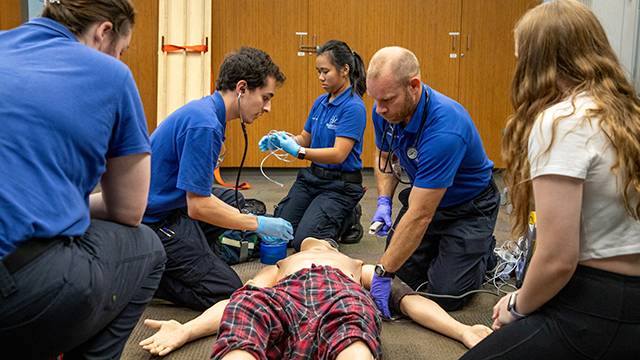This course is approved by the Kansas Board of Regents for guaranteed transfer among all Kansas Regents public postsecondary institutions. Additional courses may also be eligible for transfer. Please visit a JCCC counselor or the JCCC Registrar's office, and the Transfer Kansas portal to learn more.
This advanced emergency medical care program consists of 10 courses over five semesters (18 months), which include hospital clinicals and a field internship with an advanced life support ambulance service. You learn emergency procedures such as cardiac monitoring and defibrillation and the administration of medications and IV fluids. Successful completion of this program and subsequent certification exams will enable graduates to work as skilled paramedics and to provide sophisticated, advanced pre-hospital life support.
JCCC's Paramedic program is fully accredited by the Committee on Accreditation of Educational Programs for the EMS Professions (CoAEMSP). For more information, see the Paramedic Admissions Process web page. The information packet, which includes deadlines, admission requirements, and options for meeting academic criteria is available year-round and updated annually. The application and attachments are only available during the application period, which opens in February and closes in April each year with classes beginning in July.
This is a selective admission program with limited enrollment. If you are accepted into the program, classes begin in the summer semester and are completed in fall semester of the following year (five semesters – 18 months).
(Major Code 534A; CIP Code 51.0904)
Emergency Medical Science Program web page
Program Learning Outcomes
Johnson County Community College (JCCC) is committed to offering high-quality affordable programs that focus on developing knowledge and skills conducive to life-long learning. Both the General Education Student Learning Outcomes and Institutional Learning Outcomes convey JCCC's approach to programmatic outcomes. Additionally, students who successfully complete the Paramedic Certificate from JCCC will be able to:
- Synthesize clinical knowledge with scene and patient information to adapt to dynamic circumstances, delegate tasks, and manage resources for optimal patient care.
- Integrate comprehensive assessments and medical knowledge to formulate differential diagnoses and precise, evidence-based treatment plans.
- Manage EMS operations to ensure quality care, safe transport, and the safety of patients, the public, personnel, and responders during emergencies.
- Conduct thorough assessments, integrate findings to make informed clinical decisions, plan and implement interventions, and adjust treatments based on patient outcomes.
- Develop unbiased, culturally sensitive communication strategies to improve patient outcomes, demonstrating professionalism and advocating effectively for patients.
- Safely demonstrate all required psychomotor skills according to EMS standards, prioritizing safety for patients, self, and team members.
- Uphold ethical standards, demonstrating empathy, professionalism, and effective communication, while contributing positively to team dynamics and public health efforts.
- Implement and evaluate interventions, adjust care plans as necessary, and reflect on decision-making processes to enhance critical thinking and professional growth.
- Accurately document all assessments, interventions, and clinical decisions to create comprehensive patient records that facilitate continuity of care.
- Operate efficiently as both a team member and a leader, promoting effective team dynamics and ensuring coordinated patient care.

